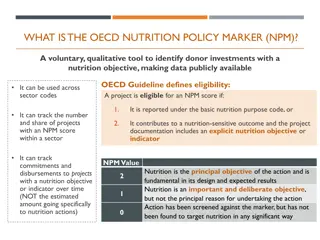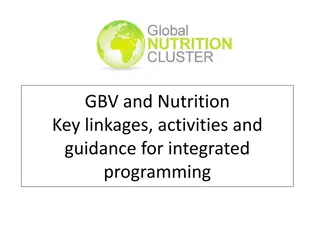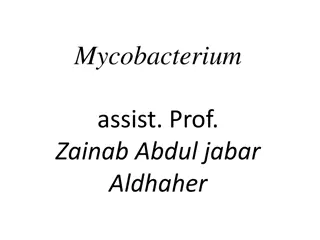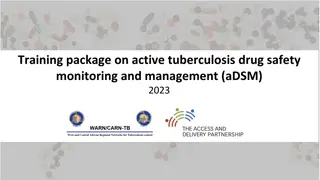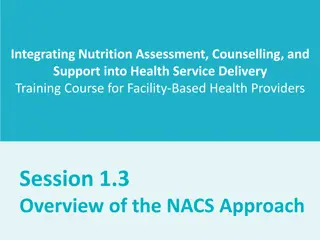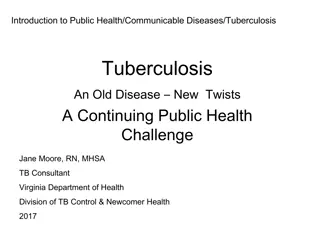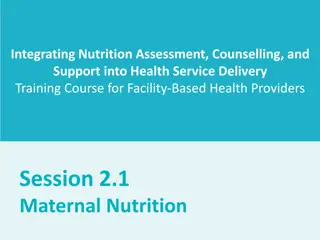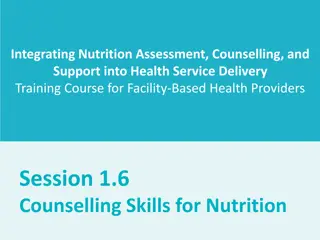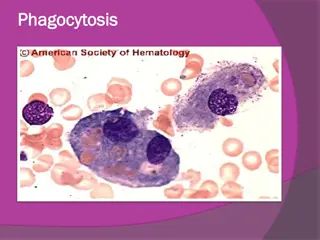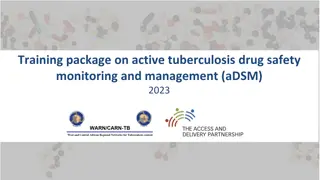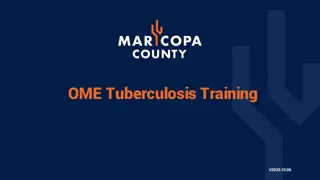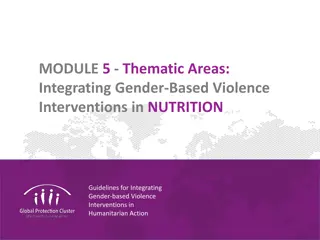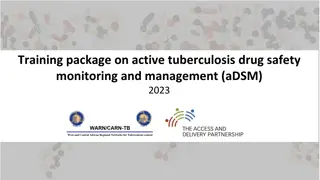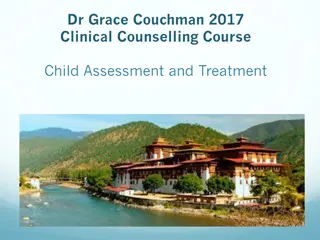Integrating Nutrition Assessment and Counselling for Clients with Active Tuberculosis
This training course emphasizes the critical relationship between nutrition and tuberculosis (TB), highlighting how undernutrition impacts TB infection and the implications of TB-HIV co-infections on nutritional status. Participants will learn about managing nutrition for individuals with active TB, understanding how undernutrition weakens the immune system, and the challenges faced in addressing nutrition-related issues in TB cases. The session objectives include describing the interaction between nutrition and TB, as well as discussing the group's findings on undernutrition and TB. The content emphasizes the importance of integrating nutrition assessment and counselling into health service delivery to provide comprehensive care for clients with active TB.
Download Presentation

Please find below an Image/Link to download the presentation.
The content on the website is provided AS IS for your information and personal use only. It may not be sold, licensed, or shared on other websites without obtaining consent from the author. Download presentation by click this link. If you encounter any issues during the download, it is possible that the publisher has removed the file from their server.
E N D
Presentation Transcript
Integrating Nutrition Assessment, Counselling, and Support into Health Service Delivery Training Course for Facility-Based Health Providers Session 3.2 Nutrition Care and Support for Integrating Nutrition Assessment, Counselling, and Support into Health Service Delivery Clients with Active Tuberculosis 1
Session Objectives By the end of the session, participants will be able to: Describe the interaction between nutrition and tuberculosis (TB) and TB-HIV co-infections Describe nutrition management for people with active TB Integrating Nutrition Assessment, Counselling, and Support into Health Service Delivery 2
Group Discussion: Undernutrition and TB What is the relationship between undernutrition and TB? How does undernutrition influence the course of active TB infection? How does TB influence nutritional status? What are the implications of TB-HIV co-infection on nutrition? Integrating Nutrition Assessment, Counselling, and Support into Health Service Delivery 3
Interaction between Undernutrition and TB Undernutrition and tuberculosis are major public health problems in developing countries. Undernutrition* is both a cause and consequence of TB. o Undernutrition weakens the immune system. Increases risk of infection with TB Increases risk of activation of latent TB *Undernutrition = both micronutrient deficiencies and protein/energy malnutrition Integrating Nutrition Assessment, Counselling, and Support into Health Service Delivery 4
Interaction between Undernutrition and TB TB makes undernutrition worse: o Loss of appetite people eat less o Diarrhoea and vomiting increases nutrient losses and impairs nutrient absorption o Increases energy needs to fight the infection o Alters metabolism (protein) Patients with active TB more likely to suffer from wasting/have lower BMI. Integrating Nutrition Assessment, Counselling, and Support into Health Service Delivery 5
Interaction between Undernutrition and TB Active TB and undernutrition together lead to: o Delayed recovery, higher mortality, greater risk of relapse TB-HIV co-infection: o Accelerates disease progression o Worsens nutrition status Integrating Nutrition Assessment, Counselling, and Support into Health Service Delivery 6
Cycle of Undernutrition and Active TB Infection
Group Discussion Can nutritional support affect recovery in TB patients? Integrating Nutrition Assessment, Counselling, and Support into Health Service Delivery 8
Nutritional Support and TB Nutritional assessment, care, and support are essential components of TB care. o Very limited evidence on specific nutrition support (e.g., supplements or fortified foods) to improve TB treatment outcomes An adequate diet containing all essential macro- and micronutrients is necessary for the well-being and health of all people, including TB patients. Integrating Nutrition Assessment, Counselling, and Support into Health Service Delivery 9
Group Discussion Can raising nutritional status of the general population reduce the burden of TB in the community? Integrating Nutrition Assessment, Counselling, and Support into Health Service Delivery 10
Raising Nutritional Status Undernutrition is associated with increased risk of TB and greater mortality/poor TB outcomes. Undernutrition and TB co-exist in many high- burden TB countries. o HIV prevalence and poverty are also known risk factors for TB and also associated with undernutrition. Reduction in undernutrition in general population should reduce TB incidence. o (No evidence of population-level nutrition interventions.) Integrating Nutrition Assessment, Counselling, and Support into Health Service Delivery 11
Group Discussion What are the advantages of good nutrition for TB clients? Integrating Nutrition Assessment, Counselling, and Support into Health Service Delivery 12
Advantages of Good Nutrition for TB Clients TB drug treatment generally improves some measures of nutritional status (e.g., weight gain). Treatment alone is generally not sufficient to fully restore nutritional status of TB patients, particularly if also food insecure. Integrating Nutrition Assessment, Counselling, and Support into Health Service Delivery 13
Advantages of Good Nutrition for TB Clients Good nutrition: o Boosts immune function o Helps to prevent weight loss and regain weight o Reduces tissue damage caused by active TB o Alleviates drug side effects o Improves quality of life Integrating Nutrition Assessment, Counselling, and Support into Health Service Delivery 14
Nutrition Assessment, Counselling, and Support (NACS) for Clients with Active TB All individuals with active TB should receive nutrition assessment and counselling at diagnosis and throughout treatment. TB patients should receive the same nutrition care and support as other individuals/populations of similar nutritional status. Integrating Nutrition Assessment, Counselling, and Support into Health Service Delivery 15
NACS for Clients with Active TB Assessment o Diagnosis: Age-appropriate anthropometric measurements: WFH children < 5 years, BMI for age children 5- 19 years, BMI adults 18+ years, MUAC children < 5 years and pregnant women Clinical measurements: history of weight loss, clinical signs of undernutrition, other health conditions and ongoing treatment Dietary assessment if nutritional status indicates undernutrition Integrating Nutrition Assessment, Counselling, and Support into Health Service Delivery 16
NACS for Clients with Active TB Assessment: o Follow-up: Anthropometric measures of weight, BMI, change in weight, change in BMI since diagnosis or last visit Classification of nutrition status Acute malnutrition, weight loss or failure to regain/maintain healthy weight requires further assessment and appropriate interventions Integrating Nutrition Assessment, Counselling, and Support into Health Service Delivery 17
NACS for Clients with Active TB Counselling and support o Aims of counselling: Improve dietary intake (energy, protein and micronutrients) Compensate for extra energy needs during recovery Support improved immune function Manage symptoms and side effects of TB drugs Integrating Nutrition Assessment, Counselling, and Support into Health Service Delivery 18
NACS for Clients with Active TB Counselling and support work with TB patients to develop strategies to: o Eat nutrient-rich (energy and micronutrients), diverse diets o Increase energy intake o Take a vitamin/mineral supplement if nutrient- rich food sources are limited 1x recommended nutrient intake (for age/sex/physiologic group) Integrating Nutrition Assessment, Counselling, and Support into Health Service Delivery 19
NACS for Clients with Active TB Counselling and support work with TB patients to develop strategies to: o Consume foods rich in protein o Avoid smoking, alcohol, and recreational drugs Integrating Nutrition Assessment, Counselling, and Support into Health Service Delivery 20
Important Vitamins/Minerals for TB Patients Nutrient Potential role in TB management Sources Vitamin A Immune function Eggs, meat, milk, cheese, squash, pumpkin, carrots, and sweet potatoes Vitamin B6 Counteracts drug side effect (periperhal neuropathy in patients receiving isoniazid treatment) Fish, beef liver, organ meats, potatoes, starchy vegetables, fruit (other than citrus), whole cereals, maize, avocado, and watermelon Vitamin C Antioxidant Fresh fruits (e.g., guava, oranges, pineapples, mangoes, pawpaw, watermelon) and green leafy vegetables Vitamin D Immune function (resistance to infection) Fatty fish such as Nile perch, milk products, cereals fortified with vitamin D, and exposure to sunlight Vitamin E Antioxidant Nuts, peanuts, seeds, vegetable oils, and green leafy vegetables Selenium Antioxidant Seafood, organ meat, meat, cereals/grains, dairy products, and eggs Zinc Antioxidant and immune function Red meat, poultry, beans, nuts, whole grains, dairy products Integrating Nutrition Assessment, Counselling, and Support into Health Service Delivery 21
Special Considerations for Children with TB Children particularly vulnerable to TB because of immature immune systems Undernutrition increases risk of disease and complicates diagnosis and treatment o Increased risk of infection and activation of latent infection in undernourished child o Undernutrition dampens child s response to TB skin test, causes missed diagnoses Integrating Nutrition Assessment, Counselling, and Support into Health Service Delivery 22
Special Considerations for Children with TB Children who are malnourished/failing to thrive who do not respond to normal treatment should be evaluated for TB. Child TB patients need energy- and nutrient-rich foods. Children with active TB and diagnosed with malnutrition should receive the same care and support provided for any other child with these conditions. Integrating Nutrition Assessment, Counselling, and Support into Health Service Delivery 23
Special Considerations for Pregnant Women with TB Pregnant women with TB at greater risk of: o LBW infant o Premature delivery o Perinatal death of infant o Increased pregnancy complications o Hypertensive disorders such as pre-eclampsia Adequate pregnancy weight gain difficult for pregnant TB patients Integrating Nutrition Assessment, Counselling, and Support into Health Service Delivery 24
Special Considerations for Pregnant Women with TB Pregnant TB patients should receive multiple micronutrient supplement with iron/folic acid and other vitamins/minerals. o If calcium intake is likely to be insufficient, should receive calcium supplementation, particularly if they are at greater risk of pre- eclampsia. Integrating Nutrition Assessment, Counselling, and Support into Health Service Delivery 25
Special Considerations for Pregnant Women with TB Pregnant TB patients with moderate malnutrition or inadequate weight gain should be provided with locally available nutrient-rich or fortified supplementary foods as needed to restore normal nutritional status. Integrating Nutrition Assessment, Counselling, and Support into Health Service Delivery 26
Summary of Key Points Undernutrition increases risk of TB infection and of latent infection progressing to active TB disease. Decreased appetite, increased needs, altered metabolism, and nutrition losses increase risk of undernutrition in TB patients and make existing undernutrition worse. Good nutrition will strengthen immunity, prevent weight loss, reduce tissue damage, and counteract drug side effects. Integrating Nutrition Assessment, Counselling, and Support into Health Service Delivery 27
Summary of Key Points All TB patients should receive appropriate nutrition assessment and counselling at diagnosis. Undernourished people with TB should receive the same treatment as others with their condition. Pregnant women and children with TB are at greater risk for undernutrition and require extra attention. Integrating Nutrition Assessment, Counselling, and Support into Health Service Delivery 28
Thank you! Questions, additions, or clarifications? Integrating Nutrition Assessment, Counselling, and Support into Health Service Delivery 29




